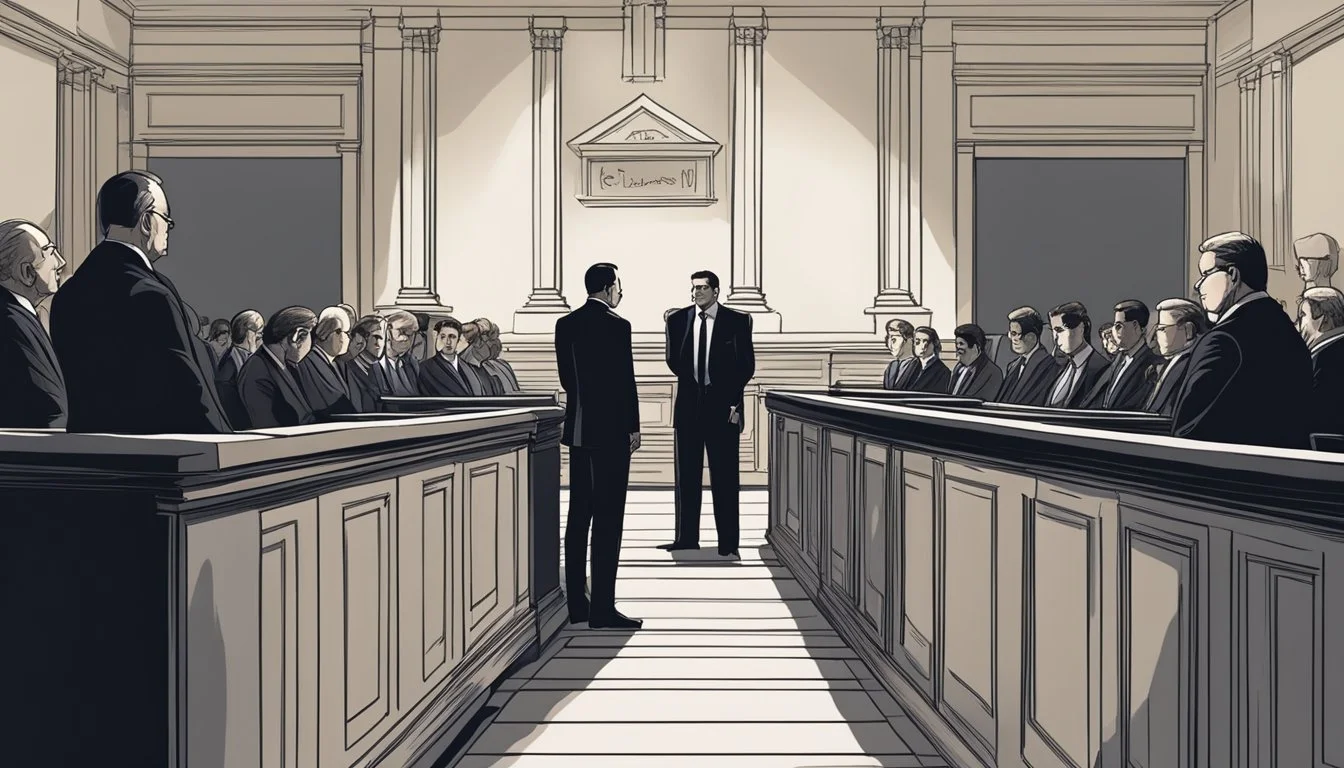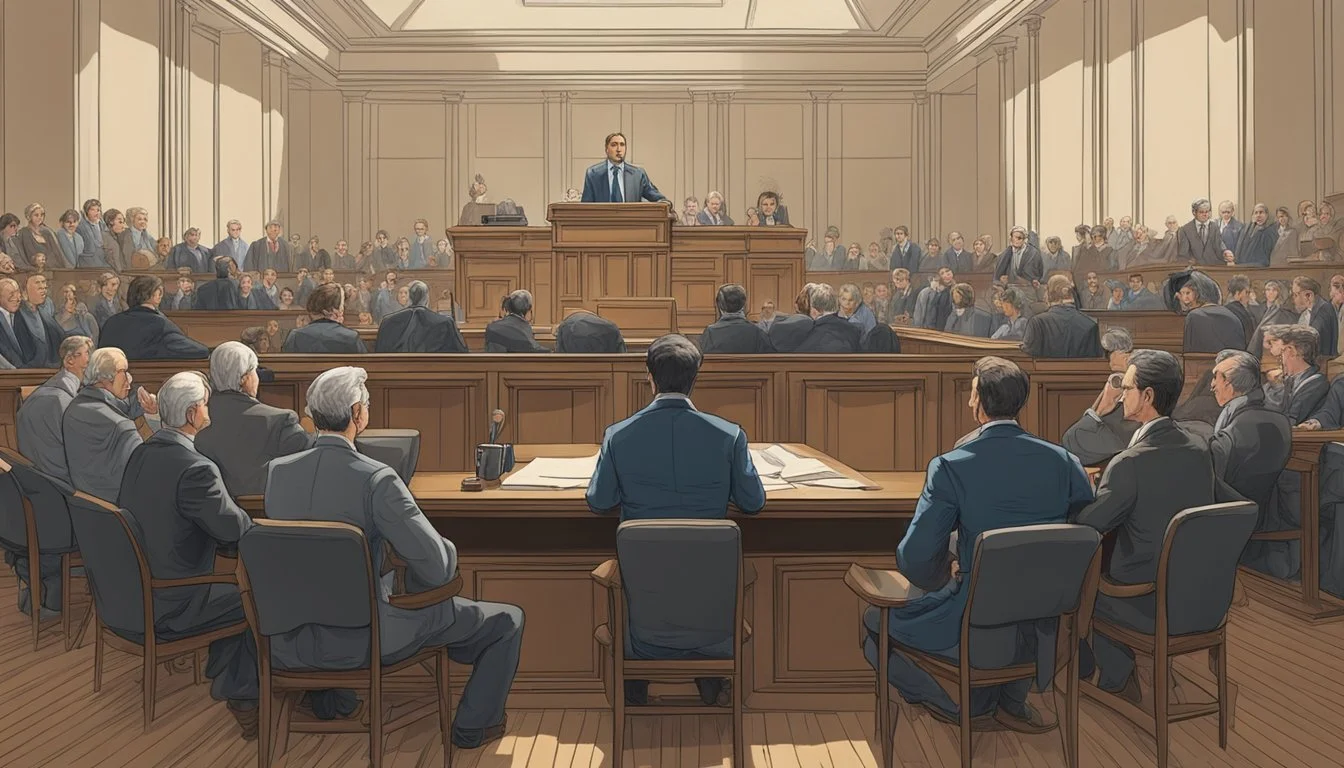Brothers in Crime: Analyzing Lyle and Erik Menendez's Relationship Through the Years
A Psychological Study of Sibling Dynamics in Notorious Murder Case
Lyle and Erik Menendez, once infamous for the brutal murder of their parents in Beverly Hills, have seen public perception shift over the decades. The brothers, convicted of first-degree murder in 1996, were sentenced to life in prison without the possibility of parole. Their case has recently garnered renewed attention, with the Los Angeles County District Attorney recommending their sentences be reevaluated.
The Menendez brothers' relationship has been a subject of fascination since their arrest in 1990. From their privileged upbringing to their shocking crime and subsequent trials, the brothers' bond has remained a central element of their story. Their shared experiences, both before and after the murders, have shaped their connection in ways that continue to intrigue the public and legal experts alike.
As the possibility of parole emerges, questions arise about how Lyle and Erik's relationship has evolved during their decades behind bars. Their journey from wealthy young men to convicted killers, and now potentially to candidates for release, offers a unique lens through which to examine familial bonds under extraordinary circumstances.
Early Life and Family Background
Lyle and Erik Menendez grew up in an affluent but troubled household. Their upbringing was marked by privilege, pressure, and alleged abuse that would later become central to their infamous murder case.
The Menendez Family Dynamics
Jose Menendez, a Cuban immigrant, worked his way up to become a successful entertainment executive. Kitty Menendez, a former beauty queen, focused on raising their sons. The family presented a picture of wealth and success to the outside world.
Behind closed doors, the atmosphere was tense. Jose was known for his strict parenting and high expectations. He pushed his sons relentlessly, especially in academics and tennis. Kitty struggled with depression and drinking.
The brothers later claimed their father sexually abused them for years. This allegation became a key part of their defense strategy during their murder trials.
The Beverly Hills Lifestyle
In 1986, the Menendez family moved to a mansion in Beverly Hills. This move represented a pinnacle of their social climbing and financial success. The 9,000-square-foot home featured a tennis court and a swimming pool.
Lyle and Erik enjoyed the trappings of wealth:
Designer clothes
Luxury cars
Exclusive country club memberships
However, the lavish lifestyle came with intense pressure to maintain appearances. The brothers felt the weight of their father's ambitions and their mother's social expectations.
Education and Tennis Ambitions
Both Menendez brothers showed promise in tennis from a young age. Jose invested heavily in their training, hoping they would become professional players.
Lyle attended Princeton University, where he played on the tennis team. However, he struggled academically and was eventually suspended for plagiarism.
Erik, younger by two years, was a nationally ranked tennis player in his age group. He attended high school in Beverly Hills but didn't match his brother's academic achievements.
Their father's emphasis on tennis and education created significant stress. The boys felt constant pressure to excel, fearing disappointment and punishment if they failed to meet expectations.
The Crime and The Trial
Lyle and Erik Menendez shocked the nation with the brutal murders of their parents in 1989. The ensuing legal proceedings captivated the public and raised complex questions about family dynamics, abuse, and justice.
The Night of the Murders
On August 20, 1989, Jose and Kitty Menendez were shot multiple times in their Beverly Hills mansion. The brothers initially claimed they were at a movie theater during the killings.
Police found no signs of forced entry. Gunpowder residue was detected on Erik's clothing. The brutal nature of the crime scene raised suspicions about the perpetrators' identities.
The brothers' lavish spending spree in the weeks following the murders drew further scrutiny from investigators.
Arrest and Media Circus
Lyle Menendez was arrested in March 1990 after the brothers confessed to their therapist. Erik turned himself in shortly after.
The case quickly became a media sensation. It was one of the first trials to be extensively televised on Court TV, captivating audiences nationwide.
Intense public interest led to numerous documentaries, television specials, and dramatizations. The trial rivaled the O.J. Simpson case in terms of media coverage and public fascination.
Courtroom Strategies and Defense
The defense team built their case around allegations of long-term sexual and emotional abuse by Jose Menendez. They argued this abuse led to the brothers' actions.
Prosecutors sought first-degree murder convictions, portraying the brothers as cold-blooded killers motivated by greed.
The first trial in 1993 ended in hung juries for both brothers. A second trial in 1995 resulted in convictions for first-degree murder and life sentences without parole.
Recent developments suggest a potential resentencing. The Los Angeles County District Attorney has recommended reviewing the case, citing new evidence and changing attitudes toward abuse claims.
Post-Conviction Developments
Lyle and Erik Menendez's lives took a dramatic turn after their conviction. Their case has seen renewed interest and legal developments in recent years.
Life Behind Bars and Rehabilitation Efforts
The Menendez brothers began serving life sentences without parole in 1996. Lyle was initially sent to Mule Creek State Prison, while Erik was incarcerated at Richard J. Donovan Correctional Facility in San Diego.
In prison, both brothers have pursued various rehabilitation programs. Lyle has been involved in educational initiatives and has worked as a tutor for fellow inmates. Erik has participated in therapy sessions and has shown interest in art programs.
The brothers were reunited in 2018 after being housed separately for over two decades. They now reside in the same unit at Richard J. Donovan Correctional Facility.
Appeals and Habeas Corpus Petitions
Since their conviction, the Menendez brothers have filed multiple appeals and habeas corpus petitions. These legal efforts have largely focused on challenging the effectiveness of their original defense and presenting new evidence.
In 2023, Los Angeles County District Attorney George Gascón announced a review of new evidence in the case. This development has reignited discussions about potential resentencing.
The brothers' legal team has argued that evidence of childhood abuse, not fully explored during their original trial, should be considered. They claim this could potentially lead to a reduction in their sentences or even parole eligibility.
Media Representation and Public Perception
The Menendez brothers' case has captivated public attention for decades through various media portrayals. These depictions have significantly influenced how people perceive the brothers and their crimes.
Documentaries and Series
Netflix's "Monsters: The Lyle and Erik Menendez Story" reignited interest in the case. This Ryan Murphy production offered a dramatized account of the brothers' lives and crimes.
Court TV's extensive coverage of the trials in the 1990s brought the case into millions of homes. It transformed the legal proceedings into a form of entertainment.
Recent documentaries have reexamined the case, presenting new perspectives and evidence. These productions often focus on the brothers' claims of abuse and their family dynamics.
The Role of Entertainment in Shaping Views
Television shows like "Saturday Night Live" have parodied the Menendez brothers, influencing public opinion through humor and satire.
True crime series and podcasts have dissected the case, offering in-depth analyses and sometimes sympathetic portrayals of Lyle and Erik.
These entertainment formats have the power to sway public perception, often blurring the lines between fact and dramatization.
Media representations continue to shape the narrative around the Menendez brothers, keeping their story in the public consciousness long after their conviction.
Current Legal Climate and Sentencing Reform
Recent developments have sparked renewed interest in the Menendez brothers' case. Legal shifts and influential supporters are pushing for a reevaluation of their sentences.
Los Angeles District Attorney's Stance on Parole
George Gascón, the Los Angeles County District Attorney, has recommended resentencing for Lyle and Erik Menendez. This move could potentially pave the way for their release from prison. Gascón's office is reviewing new evidence in the case, signaling a shift in the legal climate surrounding long-term sentences.
The district attorney's stance aligns with broader sentencing reform efforts. Gascón's recommendation reflects a growing trend to reassess life-without-parole sentences, especially for crimes committed by young offenders.
Significant Figures Supporting Resentencing
Several prominent individuals have voiced support for resentencing the Menendez brothers. Kim Kardashian, known for her advocacy in criminal justice reform, has shown interest in their case. Her involvement has brought increased public attention to the brothers' situation.
Family members of Lyle and Erik have also called for their release after more than 30 years in prison. This support from both celebrities and relatives has added momentum to the resentencing efforts.
The backing of high-profile figures has helped spotlight the case within the context of broader discussions on sentencing reform and rehabilitation.
The Menendez Brothers' Relationship Over Time
Lyle and Erik Menendez's bond evolved dramatically through their shared experiences of abuse, crime, and incarceration. Their relationship faced periods of closeness and estrangement as they navigated the aftermath of their parents' murders.
Bond and Estrangement
The Menendez brothers had a complex relationship growing up. As children, they formed a close bond, partly due to their shared experiences of alleged abuse by their father. This connection strengthened as they faced the pressures of their privileged but troubled upbringing.
However, their relationship became strained in the aftermath of their parents' murders. The brothers initially attempted to maintain a united front, but cracks began to show during the investigation and trial process.
Lyle and Erik's differing reactions to the crime and its consequences led to periods of estrangement. Their individual struggles with guilt and the weight of their actions created distance between them.
Shared Experience of Abuse and Trials
The brothers' claims of sexual and emotional abuse by their father became a central element of their defense strategy. This shared trauma reportedly reinforced their bond during the legal proceedings.
Throughout their trials, Lyle and Erik presented a united narrative, supporting each other's accounts of abuse and the events leading to the murders. Their collaborative approach during this period demonstrated a renewed closeness.
The brothers' relationship was further tested by the intense public scrutiny and media attention surrounding their case. They relied on each other for emotional support while facing life-altering consequences.
Post-conviction, Lyle and Erik's bond has reportedly remained strong. They have maintained contact through letters and occasional visits, sharing their experiences of life behind bars.
Influence of the Menendez Case on Society
The Menendez brothers' case has left a lasting impact on American society and popular culture. It sparked intense public interest in true crime stories and courtroom dramas.
The televised trial in 1993 was groundbreaking, becoming one of the first high-profile cases to be broadcast nationwide. This paved the way for future televised trials and true crime programming.
Over time, public perception of the brothers has shifted. Initially viewed as cold-blooded killers, some now see them in a more sympathetic light. This reflects changing attitudes towards abuse allegations and trauma.
The case has influenced discussions on male sexual abuse victims. It has helped bring attention to the experiences of men and boys who suffer abuse, challenging societal stereotypes.
True crime documentaries, podcasts, and social media have revisited the Menendez case. This renewed interest has led to debates about justice, family dynamics, and the long-term effects of childhood trauma.
The brothers' story has been adapted into various forms of media:
TV movies and documentaries
Books and articles
Podcast series
Social media discussions
These adaptations have kept the case relevant in popular culture, sparking new conversations about crime, punishment, and rehabilitation.





